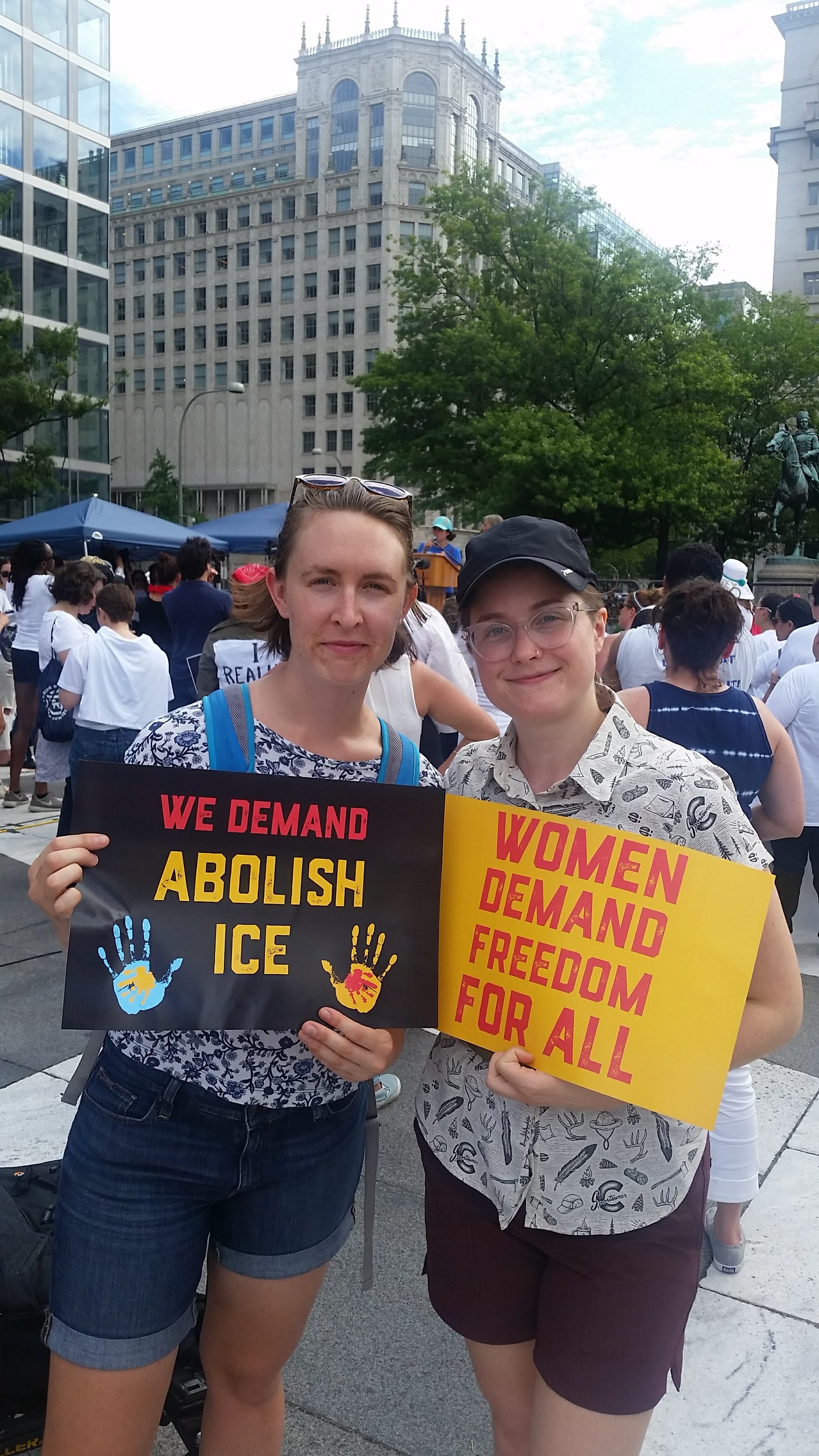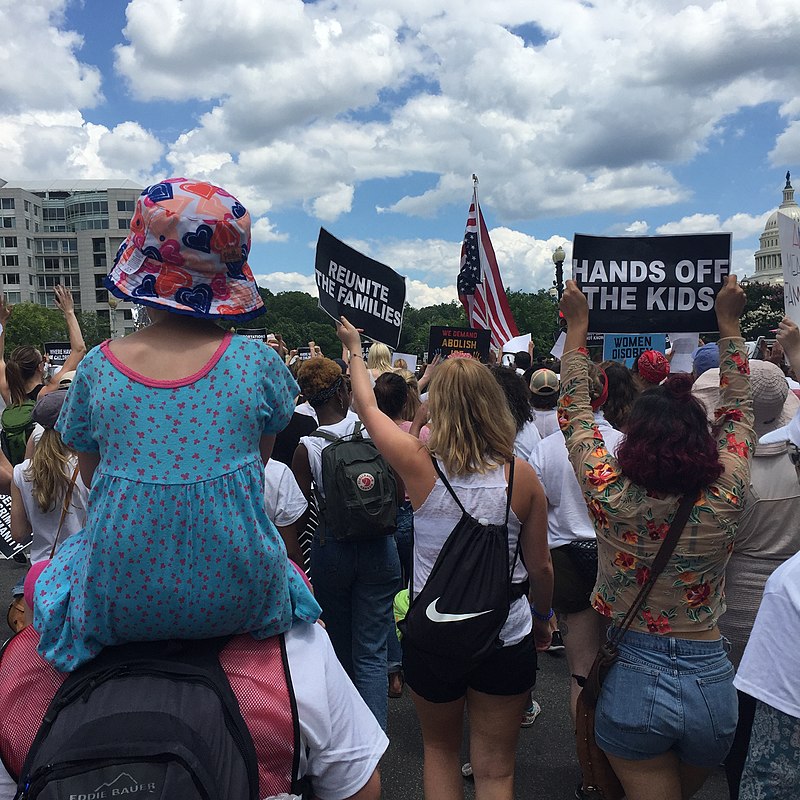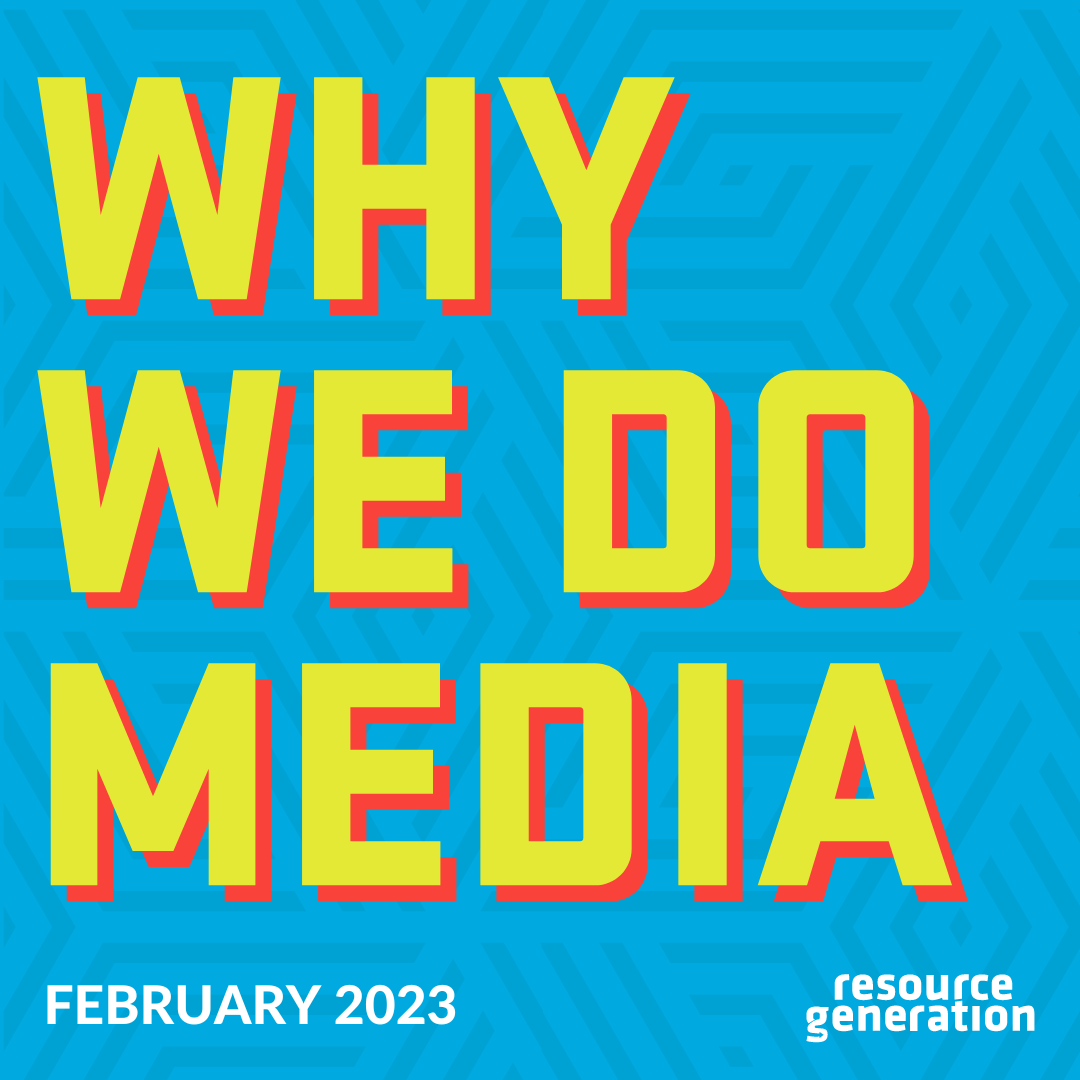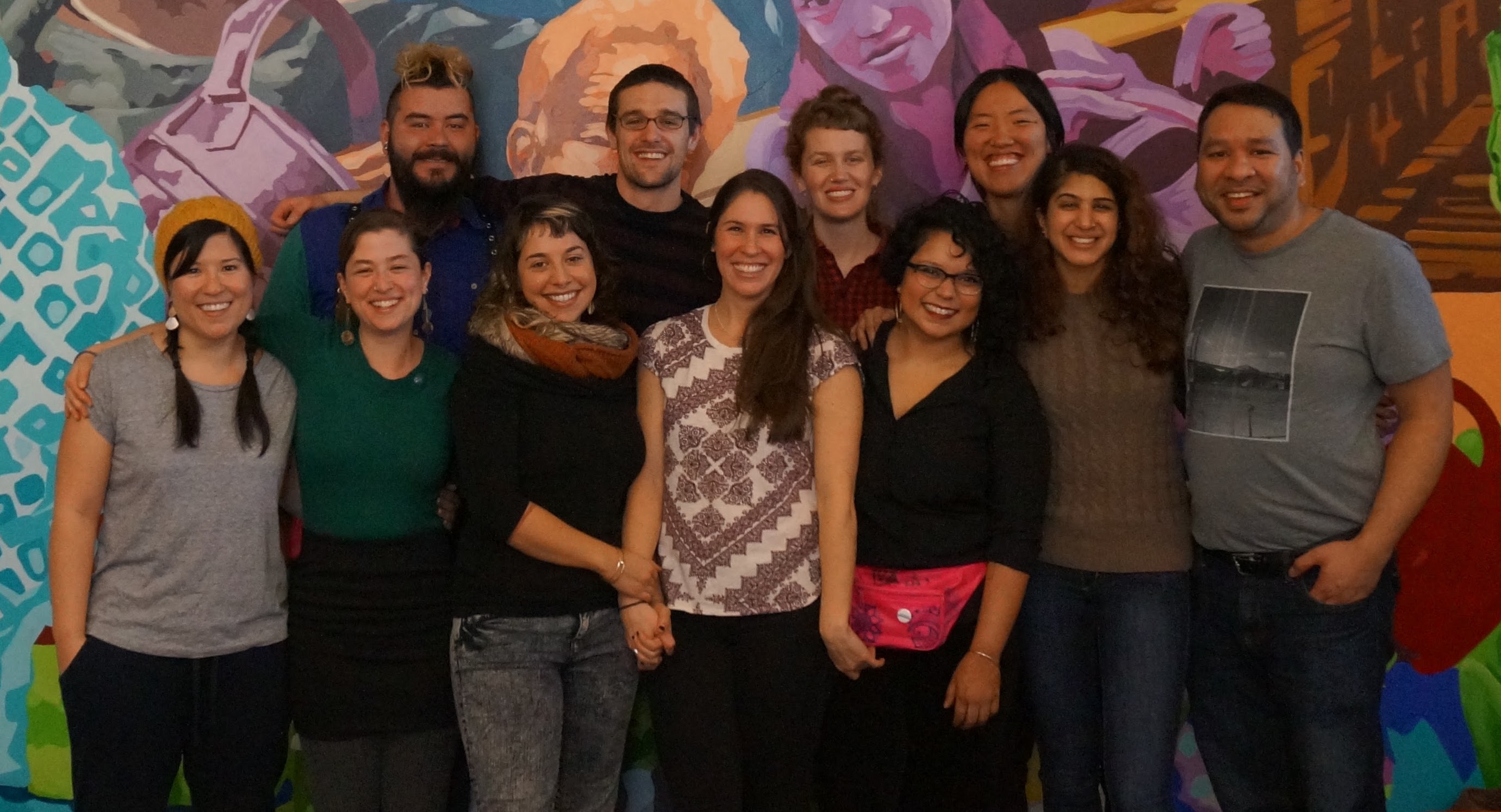
Corinne and her girlfriend, Kelly, also an RG constituent, at the #AbolishICE Women’s March rally in D.C.
Over the last few months, images of children in cages triggered a lot of us into facing the awfulness of the U.S. immigration enforcement machine. The attention paid to separating families at the U.S.-Mexico border has also brought to light how ICE has been terrorizing individuals and families for years and how the larger prison system locks poor and immigrant families in a cycle of surveillance, criminalization, caging, and debt.
As someone who descends from ancestors who were never criminalized as they migrated from Europe to the U.S., I have found myself, for the first time, reckoning with knowing what my neighbors go through. My reactions have ranged from shock to numbness to compulsive news scrolling to a sense of total immobilization.
As a young, wealthy, white citizen of the U.S., I spend a lot of time wondering: what do I do in the midst of this moment, knowing the awfulness that has transpired and will continue to in the name of nationalism and racism? And as a person who also has inherited wealth, I also wonder: what do I do about the fact that my personal inheritance, which is currently in stocks on Wall Street, grows when the companies I’m invested in profit from immigrant labor, detention, and deportation? When my neighbors and others risk so much to keep their lives and the lives of their loved ones safe, what is a meaningful act of solidarity for me?
This spring, wanting to do something besides watch helplessly as things got worse, I joined the Boston Immigration Justice Accompaniment Network. I’m grateful to have had the opportunity to put my resources, mind, and body to work in solidarity with my neighbors to reduce the escalating harm of our immigration system. This network came into being in November of 2017 when two labor organizers of color, one inside immigration jail and one outside, saw a way to connect the well-meaning people of faith who wanted to help into the network of mutual aid and support that already existed within organizing communities, inside jails, and in many immigrant communities.
Since then, this network has organized accompaniment to court or at ICE check-ins, legal referrals, fundraising for bond or legal fees, letters of support from the community, rides for families to visit loved ones in deportation, and logistical assistance with paperwork and bond payments, for any of our neighbors who are detained by ICE. By standing actively against injustice and using our resources to reduce the harm of the larger racist prison industrial complex, we are creating a new system and infrastructure for caring for each other, guided by justice and solidarity. For me, taking steps to act against my despair and embody the world I want to live in — a world free of all prisons — has been heartening and hopeful.
While our network typically relied on raising money for an individual bond through crowdfunding, I heard about Eduardo’s situation two days before paying his bond. Raising $2000 was not attainable for his family, and I decided not to wait on the weeks crowdfunding could take, and to go ahead and post bond for him. Unlike in criminal proceedings, people facing deportation are not entitled to any legal representation, and it was urgently important for him to be out of detention, home with family, and able to get help with his case before a court date looming at the end of the week. And, I had the money.
In the days between hearing about his case and posting the bond, I couldn’t stop thinking about Eduardo.
When I was getting ready for bed in my comfortable apartment, I thought about an 18-year-old I didn’t know trying to sleep under fluorescent lights in an immigration prison just miles from me. When I was preparing the food I wanted to eat at the time I wanted to eat it, I thought about navigating a guarded cafeteria as a scrawny teen, missing your mom’s cooking, and seriously wondering if you’ll ever see your parents and siblings again. The contradiction was painful to hold: When I was 18, I graduated from an amazing private high school in Pennsylvania and followed my dreams of being an agent for peace to a volunteer with a mediation program in Oregon. This was far from the realities of an immigration jail.
While I finally have a plan to divest and redistribute this undeserved wealth, the varied feelings I feel when taking in immigration news —- overwhelm, horror, desire to do something, and inability to act — are heightened through knowing that my inheritance is still sitting on Wall Street, profiting from the prison system that exploits immigrant labor and imprisons immigrant families.
In my grandparents’ and great-grandparents’ generation, my family’s wealth grew from ownership and management in the agriculture and manufacturing industries in the U.S. and Europe. They put that wealth into the stock market — where massive profits made possible by the New Deal, Reaganomics, and the latest tax bill were systematically shifted not to workers but to shareholders, where the wealth consolidated and grew even bigger. During the course of my lifetime, nearly anyone who owns stocks on Wall Street has also profited from the private prison industry. That is, shareholders profit when the industry of caging, shackling, and deporting — and the communications, ankle bracelet, bail bond, construction, and other systems adjacent to it — grows.
My wealth increases when companies like GEO Group and Core Civic, among the largest for-profit prison companies, hold billions in federal contracts to transport and detain immigrants, and Microsoft holds a $19.4 million contract to enable ICE to identify and track “aliens” using facial recognition technology. While the latest racist policies like family separation and ‘zero tolerance’ increase business for the private prison industry, it’s also worth noting the violent hypocrisy of those policies’ existence amidst wealth theft and underpayment of immigrants in the service, agriculture and domestic labor sectors, as well as decades-old U.S.-imposed political and economic conditions. Around the world, the threat of violence due to the U.S.-funded war on drugs, U.S.-sanctioned military dictatorships in Latin America, and the impossible economic conditions due to free trade cause many families to make the impossible decision to migrate to a nation where they may have to live beneath the radar for the rest of their lives.
In the meantime, while the mostly white ruling class’ wealth grows, our Asian, Latinx, Arab, African, Haitian, and Dominican immigrant neighbors in Boston and around the country are being terrorized, targeted, and forced into impossible situations by this racist immigration system. They are at constant risk of being apprehended by ICE at home, work, and even while showing up to immigration appointments. Here, in and around Boston and the Northeast, they are detained at the Plymouth, Bristol and Suffolk County ICE jails and the ICE Office in Burlington. With no Constitutional right to legal representation or ability to post $1,500-$14,000 bonds set in immigration court, they might be tried at the JFK Federal Building in Boston or even by video conference from wherever they are detained. They are deported from Logan Airport without fair trials.
As a young wealthy person, meaningful acts of solidarity across class, race and immigration status are ones that push me beyond both the urgency and the immobilization with which I feel overcome and to be able to notice my deep hopes and dreams for a fair and just economy and society. In this future, lives are not shortened by racism or nationalism, all families are able to live in homes, not forced to live in cages, and wealth stays in the communities where it is created. To realize this future, I think of Audre Lorde’s idea that you “can’t use the master’s tools to dismantle the master’s house.” This future will not be realized if those who have wealth and power hold on to it — we must incite a just transition of that wealth and power to the people oppressed by our current capitalist system. While my wealth, whiteness, U.S. citizenship, and connections give me a certain kind of power, they also keep me alienated from deep, interdependent, regenerative connection with people, animals, and the earth. I am deeply invested in redistributing wealth and power as a wealthy white person, because using my life to build systems that are alternatives to violence and extraction will make me whole.
When I arrived at the ICE office in Burlington to post Eduardo’s bond, I was surprised to find it situated within a suburban office park. In the parking lot, right next to where I parked, there’s a cage for “yard time” for people in immigration jail inside. In the entryway, above the metal detector, there’s an eerie portrait of our current president. I was the lone white woman in the waiting room and was treated with extra attention by another white woman processing my bond payment behind the desk. I found out I was the only person who’d arrive to post bond for anyone that day — in a system where a few thousand people are held each year in ICE jails across Massachusetts and New England.
In the past months, I’ve donated to almost all of the 20+ bonds we’ve raised, fundraised my network, made the spontaneous decision to pay Eduardo’s bond, and been part of a group building a fundraising strategy to invite people of faith to actually leverage their resources to build the world we are called to — by building a fund big enough to bond hundreds of people out at once! Over these past months, I’ve been asked to give big and I hope to give bigger — the migrant, indigenous, poor and working-class leaders of the long-fought movement to abolish ICE — and the larger system of profiting from policing and caging — NEED our resources and support to build and scale the organizing that is needed to win, NOW.
At the end of June, I participated in a powerful direct action: 600 women committing civil disobedience in the Hart Senate Building in Washington D.C. I was lucky to hear Linda Sarsour of the Women’s March speak directly to the white women in the crowd turning out for their first act of civil disobedience. While Linda noted we each need to take big risks in this moment of terror against families and communities, white folks have a special role to play: while we are often late to the frontlines of using our voices to show up against injustice, our boldness and visibility are less risky than those of the poor, working-class, queer and trans people of color who lead us.
So, let us continue to answer the questions. What are the meaningful risks we, as white and/or wealthy young adults, should take to end a system that relies on putting any human in a cage? Knowing the violence and extraction it’s built on, what’s the point of holding onto our wealth when we consider what kind of future we’re saving for? In a world of supposed risk, the real risk is failing to realize a new, more just world. What’re the boldest things we can do to ensure that doesn’t happen?
For me, the decision to move my inheritance off Wall Street — and divest of the privileges of unearned wealth — has helped me reclaim my own liberation. Stepping out to tell others about it — and bring people in to decide how to redistribute my inheritance — has strengthened my ability to imagine the just, interconnected world I want to live in.
There’s never been a riper time to divest from the current system and shift the flow of resources and power so there will be a future where no one profits from the caging of another. Move from a place of love, not fear. Reduce the harm of our current system by seeding bail and bond funds, while fighting for the abolition of old systems that profit from policing and caging.
Divest loudly from the investments that grow wealth by exploiting our neighbors and our planet, and invest in the people and systems that are democratic, equitable and sustainable. Imagine and take part in new networks of care, solidarity, and interdependence. These are the pathways to our collective liberation, and, especially as wealthy people, the pathway to our own.
—
Corinne Jager is a member of Resource Generation’s Boston-area chapter. Learn more about RG chapters here.
Resource Generation is the only organization in the U.S. organizing young people with wealth toward the equitable distribution of wealth, land, and power. As a result of becoming a member of Resource Generation, our members end up giving away 16-times more money to economic and racial justice organizations than they did before. Learn more and support our work by becoming a member here.
If you need help figuring out your class background, check out our definition of wealth and/or fill out this intake form to have one our national organizers reach out to you.




